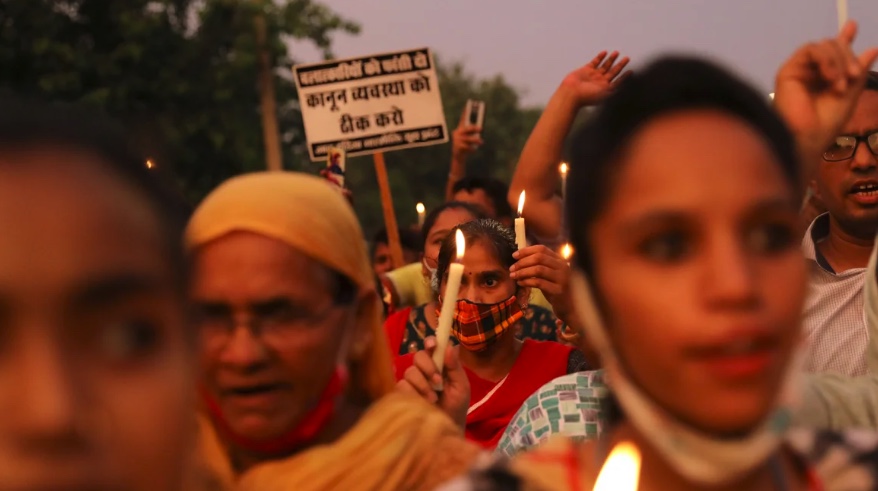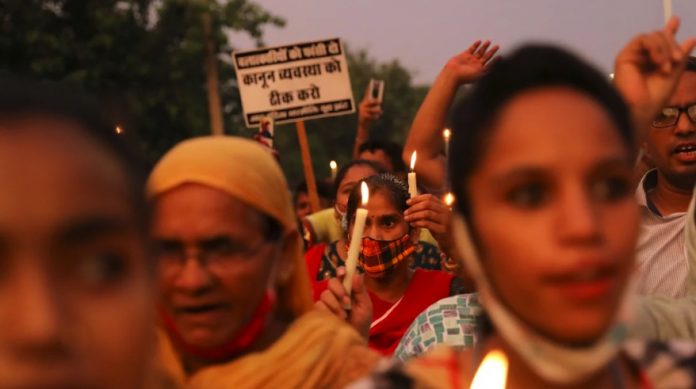ศาลสูงของรัฐมัธยประเทศยกฟ้องที่ผู้หญิงคนหนึ่งกล่าวว่า มีเพศสัมพันธ์ที่ถูกบังคับโดยสามีของเธอ โดยอ้างว่าไม่มีกฎหมายที่กำหนดให้การข่มขืนสมรสถือเป็นความผิดทางอาญา สิ่งนี้ตอกย้ำช่องว่างทางกฎหมายที่ทำให้เกิดการบีบบังคับคู่สมรสเมื่อภรรยามีอายุเกิน 18 ปี นักเคลื่อนไหวที่ผลักดันให้มีการปฏิรูปต้องเผชิญกับฝ่ายค้านอนุรักษ์นิยมที่กลัวการแทรกแซงประเพณีการแต่งงาน ประเด็นนี้ รวมถึงคำพิพากษาแยกของศาลสูงเดลีเมื่อเร็วๆ นี้ กำลังรอการพิจารณาของศาลฎีกา ตามคำตัดสินของศาลสูงของรัฐมัธยประเทศ ผู้หญิงรายดังกล่าวแจ้งตำรวจว่าหลังแต่งงานได้ไม่นานในปี 2562 สามีของเธอมีส่วนร่วมใน “เพศสัมพันธ์ที่ไม่เป็นธรรมชาติ” ตามที่กำหนดในมาตรา 377 ของประมวลกฎหมายอาญาของอินเดีย ความผิดนี้ครอบคลุมถึง “การมีเพศสัมพันธ์ทางกามารมณ์โดยไม่ได้รับความยินยอมซึ่งขัดต่อธรรมชาติของมนุษย์กับผู้ชาย ผู้หญิง หรือสัตว์” ซึ่งก่อนหน้านี้ใช้ในการดำเนินคดีกับคู่รักเพศเดียวกันที่กระทำโดยความยินยอม ก่อนที่การรักร่วมเพศจะถูกลดทอนความเป็นอาชญากรรมโดยศาลฎีกาในปี 2561
ตามเอกสารของศาล ผู้หญิงรายดังกล่าวกล่าวหาว่า “มีเพศสัมพันธ์ผิดธรรมชาติ” หลายครั้ง โดยเปิดเผยหลังจากที่เธอได้ความไว้วางใจกับแม่ของเธอ ซึ่งสนับสนุนให้เธอยื่นเรื่องร้องเรียนในปี 2565 แม้ว่าเธอจะกล่าวหาสามีเธอไป แต่ทนายของสามีกลับแย้งว่าสถานภาพการสมรสได้รับการยกเว้นจากพวกเขา ผู้พิพากษา Gurpal Singh Ahluwalia อ้างถึงการยกเว้นการข่มขืนสมรสของอินเดีย ซึ่งเป็นชนกลุ่มน้อยในยุคอาณานิคมในการพิจารณาคดีของเขา เขาเน้นย้ำว่าแม้แต่การกระทำที่รุนแรงก็ไม่ถือเป็นการข่มขืนหากเกี่ยวข้องกับคู่สมรส ศาลฎีกาของอินเดียเพิ่มอายุความยินยอมในการสมรสเป็น 18 ปีในปี 2560 ผู้หญิงคนดังกล่าวยังกล่าวหาว่าสามีภรรยาของเธอล่วงละเมิดที่เกี่ยวข้องกับสินสอดด้วย คำปราศรัยของ Ahluwalia จุดชนวนการถกเถียงเกี่ยวกับการปฏิบัติต่อสตรีของอินเดีย ทำให้เกิดการเรียกร้องให้มีการปฏิรูปกฎหมายอย่างเร่งด่วนจากผู้สนับสนุนสตรี
จากการสำรวจสุขภาพครอบครัวแห่งชาติของอินเดียประจำปี 2562-2564 พบว่าผู้หญิงช่วงอายุ 15-49 ปี 17.6% ถูกสำรวจว่ารู้สึกว่าไม่สามารถปฏิเสธการมีเพศสัมพันธ์กับสามีได้ และ 11% เชื่อว่าความรุนแรงเป็นสิ่งที่สมเหตุสมผลที่จะใช้ความรุนแรงหากผู้หญิงปฏิเสธ ช่องทางทางกฎหมายสำหรับการกล่าวหาว่าข่มขืนคู่สมรส ได้แก่ การขอคำสั่งห้ามหรือข้อกล่าวหาภายใต้มาตรา 354 และ 498A ของประมวลกฎหมายอาญา แต่การบังคับใช้จะแตกต่างกันไป ทนายความ Karuna Nundy สังเกตว่าผู้พิพากษาอาจลังเลที่จะกำหนดโทษจำคุก การศึกษาเกี่ยวกับโรงพยาบาลในมุมไบในปี 2565 พบว่าตำรวจมักเพิกเฉยต่อคำร้องเรียน โดยไม่มีคดีใดเกิดขึ้นในหมู่ผู้รอดชีวิตจากการข่มขืน 1,664 ราย ผู้หญิง 4 คนได้รับการแจ้งว่าการข่มขืนสมรสไม่ใช่อาชญากรรม โดยเน้นย้ำถึงช่องว่างในการคุ้มครองทางกฎหมายสำหรับผู้หญิงที่แต่งงานแล้ว
An Indian woman alleged that her husband coerced her into engaging in ‘unnatural sex.’ A judge ruled that such conduct is not deemed criminal within marriage.

The Madhya Pradesh High Court dismissed a woman’s claim of “unnatural sex” by her husband, citing the absence of laws criminalizing marital rape. This underscores the legal gap allowing spousal coercion when the wife is over 18. Activists pushing for reform face conservative opposition fearing interference in marital traditions. The issue, including a recent Delhi High Court split verdict, awaits Supreme Court review. As per the Madhya Pradesh High Court ruling, the woman informed the police that shortly after their marriage in 2019, her husband engaged in “unnatural sex,” as defined by Section 377 of India’s penal code. This offence covers non-consensual “carnal intercourse against the order of nature with any man, woman, or animal,” previously employed to prosecute same-sex couples engaging in consensual acts before homosexuality was decriminalised by the Supreme Court in 2018.
According to court documents, the woman alleged multiple instances of “unnatural sex,” revealing them after confiding in her mother, who encouraged her to file a 2022 complaint. Despite her accusations, the husband’s lawyer argued marital status exempted them. Justice Gurpal Singh Ahluwalia cited India’s marital rape exemption, a colonial-era remnant, in his ruling. He underscored that even severe acts didn’t constitute rape if involving spouses. India’s Supreme Court raised the marital consent age to 18 in 2017. The woman also accused her in-laws of dowry-related harassment. Ahluwalia’s remarks reignited debates on India’s treatment of women, prompting calls for urgent legal reform from advocates like Indira Jaising.
According to India’s 2019-2021 National Family Health Survey, 17.6% of surveyed women aged 15-49 felt unable to refuse sex with their husbands, and 11% believed violence was justified if they declined. Legal avenues for marital rape accusations include seeking restraining orders or charges under Sections 354 and 498A of the Penal Code, but enforcement varies. Lawyer Karuna Nundy noted judges may hesitate to impose prison sentences. A 2022 study of Mumbai hospitals found police often disregarded complaints, with no cases filed among 1,664 rape survivors. Four women were told marital rape wasn’t a crime, highlighting gaps in legal protection for married women.
By CNN NEWS

















